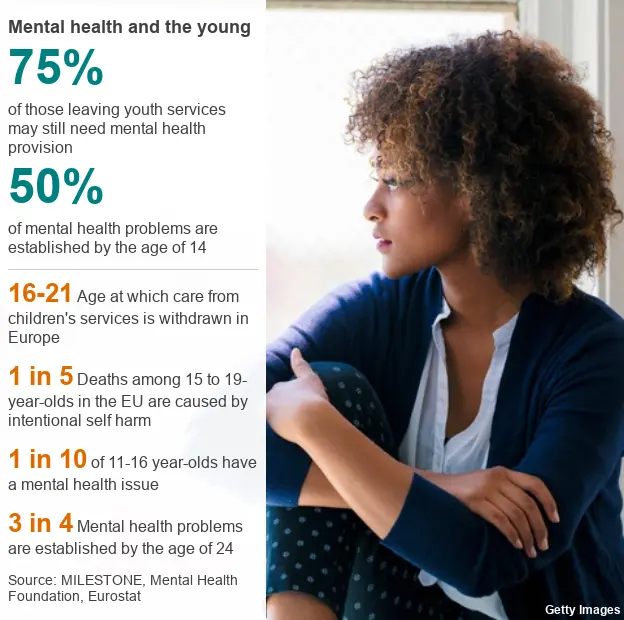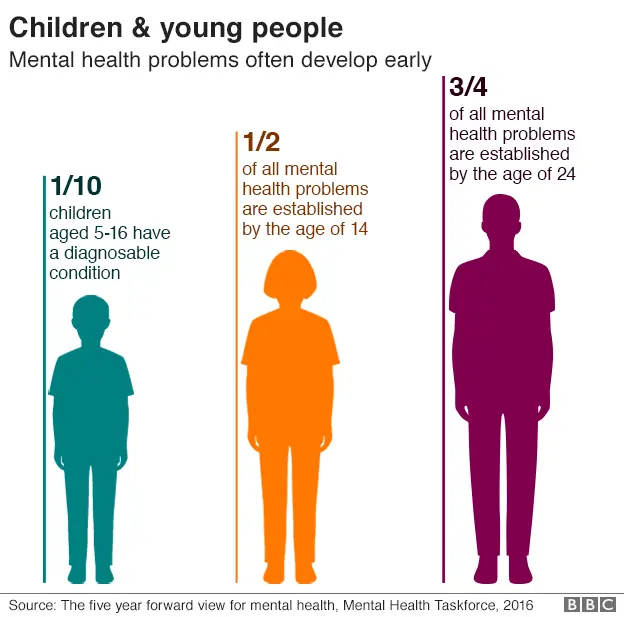Mental illness: Why help ends at a milestone birthday
 Getty Images
Getty ImagesEvery year thousands of mentally ill young people find the help they are receiving comes to an abrupt end when they hit a significant birthday.
Across Europe, it is a point reached somewhere between the ages of 16 and 21, marking the moment at which care from children's services comes to an end.
Many are in need of ongoing support and treatment, but among those moving into adult care many report feeling abandoned, neglected or poorly looked after.
Others fail to get any support at all from adult services - their care reaching a very real cliff edge.
This challenging time often arrives alongside other rapid changes like leaving home, going to university, starting work or beginning new relationships.
What can be done to improve things for them?
'Not ill enough'
The experiences of 1,000 young people leaving child and adolescent mental health services (Camhs) and entering adult mental health services (Amhs) are being followed in eight European countries: the UK, Ireland, Belgium, the Netherlands, France, Germany, Italy and Croatia.
Their stories are striking and often have common features:
- Being discharged around their 18th birthday and not told about options
- Being told they are not "ill enough" for adult services
- Having to persuade adult services that they need help
- Having decisions made about them, without being involved
- Having to repeatedly tell their story
Some young people are unable to attend school, see their friends or even leave their bedrooms.
It is not uncommon for them to wait for appointments with an adult service for a year or more - only to then be told that the service will not accept them, the MILESTONE Project has heard. It is led by the University of Warwick, which is working with researchers in the other study countries.

Common problems
In the UK - as in many other European countries - mental health problems in children and young people are on the rise, affecting an estimated one in 10 children aged five to 16.
Anxiety and depression are among the most common conditions, with girls aged 14 and above more likely to be affected by these problems than boys. Growing up in a poor household increases the risk of mental illness three-fold.
In the UK fewer than half of young people with mental health problems receive support from their Camhs service.
Across Europe, the provision of Camhs varies considerably - from a high of 12.9 per 100,000 young people receiving help in Finland, to 0.5 per 100,000 in Bulgaria.
Being unable to find help can be catastrophic. Nearly one in five deaths among 15 to 19-year-olds in the EU is caused by intentional self harm - second only to transport deaths.

Emma's story
In my teens I suffered from depression, anxiety and self-harm. At my worst, I felt like there was absolutely no hope left in the world and no place in it for me.
I had help from children's mental health services from the age of 15 and the plan was that I'd leave at 18. But I was so worried about this my problems worsened. University was delayed - I couldn't get on a bus, let alone move area.
A year later I started my studies, but leaving the service literally felt like grief. Having had support for the majority of my teenage years, the thought of having none scared me a lot. Where would I turn to?
Two or three months in, my difficulties returned and I started self-harming again. A tutor walked me over to university counselling services and I eventually saw a support worker who understood my difficulties.
My problems became worse and years after leaving children's services I was finally sent to adult services. I retold my story for what felt like the 100th time, to more people than I can count. It was horrendous.
- For help and support on mental health visit the BBC Advice pages.

An end to care
In most European countries support from children's services ends at 18. In some places it is lower, including Cyprus (15-19), Malta (16) and France (16-18). In the UK Camhs support normally continues until 18.
As many as 75% of those in the UK and an average of 33% across Europe are considered to be in need of further treatment.
Left untreated, the long-term risks for these young people include poor performance at school, a greater risk of drug and alcohol misuse, contact with the criminal justice system and unemployment.

But making the move to adult services is often difficult. There are different methods of looking after adults suffering from mental illness, and it is a separate speciality.
In the UK, one in three young people who attended Camhs and needed continued support, didn't manage to make the move.
Those with depression and/or anxiety, or those with a neurodevelopmental disorder such as attention deficit hyperactivity disorder (ADHD), are among those most affected.
What might help?
Across Europe, improving access to treatment and support for young people with mental health problems is becoming a greater priority.
In some parts of the UK, for example, services are reorganising. There are now a number of mental health services offering support, care and treatment for people up to the age of 25.
 Getty Images
Getty ImagesIn other areas, work is going on to develop new support in schools and colleges. Some UK universities are taking steps to improve mental health care for students after concern about the number of suicides.
The first steps are also being taken in a number of other countries.
In Germany, a "task force" has been created to improve cooperation around the care of young people moving between services.
A similar scheme is also under way in the Netherlands, while France has recently created specific inpatient and outpatient facilities for adolescents called "Maison des Adolescents".
Understanding what else might help young people with mental illnesses is central to the work of the MILESTONE Project.
Seeing what does - and doesn't - work for them will help inform how care might be provided in the future.
Given that about 50% of mental health problems are established by the age of 14 and 75% by the age of 24, it is a lesson worth learning.

About this piece
This analysis piece was commissioned by the BBC from an expert working for an outside organisation.
Helena Tuomainen is a senior research fellow at Warwick Medical School and the scientific research manager for the MILESTONE project.
The MILESTONE project is an EU-funded international research project focusing on the transition of care from child to adult mental health services. It is led by the University of Warwick, in partnership with seven other European research centres in the study countries.

Edited by Duncan Walker
